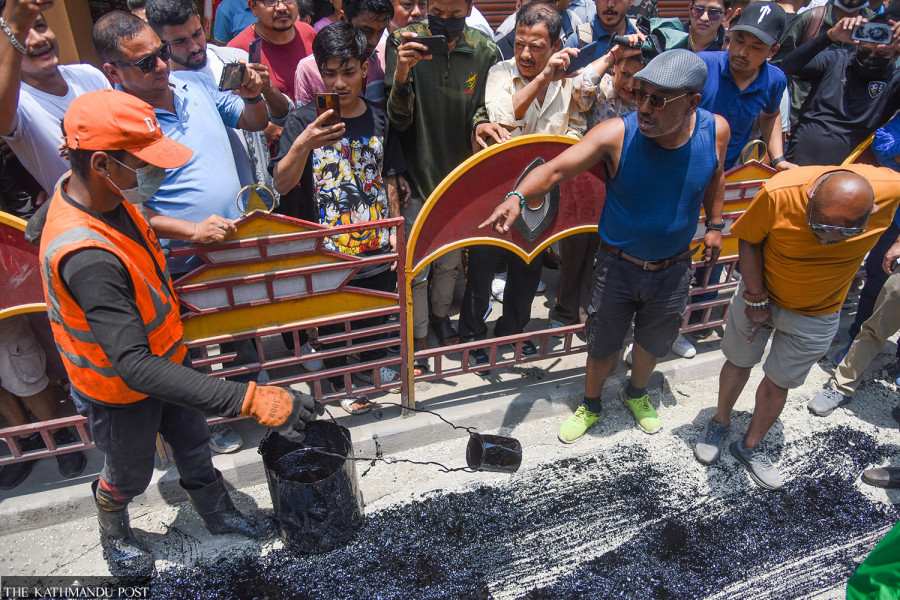Kathmandu
Congress backs Kathmandu mayor’s New Road sidewalk expansion bid
Road office, under the ministry led by UML, foiled Balendra Shah’s plan to widen footpaths in the business district.
Post Report
Days after Kathmandu Mayor Balendra Shah joined the Nepali Congress in accusing CPN-UML chair KP Sharma Oli in a multi-billion-rupee failed land swap bid in Jhapa, lawmakers from the main opposition have backed Shah in his initiative to expand the sidewalks at New Road—something the UML opposes.
Speaking in the House of Representatives on Thursday, Congress General Secretary Bishwo Prakash Sharma backed the mayor's plan to expand pedestrian lanes at New Road that clashed with the vision of the Road Division, led by a UML minister, to widen the roads instead.
Lawmaker Sharma said that in case of conflict between a central agency and a local unit, the federal government should show more restraint than the local government.
“Mayor Balendra Shah’s initiative to widen pavements at New Road is the right step for the general public’s convenience,” Sharma told the House. “Mayor Shah should be allowed to continue his work without any interference as what he is doing is absolutely right.”
The conflict escalated when the Road Division, under the federal government, intervened and paved the road cut by the metropolis on Monday. The metropolis had cleared stretches a few metres wide on either side of the road to create space for pavements.
The dispute resulted in a standoff between those deployed by the Road Division and the Kathmandu municipal staff, with different people taking different sides. The tension eased without any untoward incident as the metropolis backed off after the federal government deployed police at the site.
The Road Division, under the Ministry of Physical Infrastructure and Transport, is led by Deputy Prime Minister Raghubir Mahaseth, who is a UML secretary. The dispute grew to involve those supporting Mayor Shah and the UML, the biggest partner in the Pushpa Kamal Dahal-led coalition, and also spilled over to social media.
In Parliament, lawmakers from the main opposition Nepali Congress threw their weight behind Shah.
Not only the party’s general secretary Sharma, two other lawmakers from the party also expressed their support for the mayor in the House meeting on Thursday.
Congress lawmaker Arjun Narsingh KC said the conflict between the federal government and the Kathmandu mayor has raised serious questions about the federal government’s intent.
KC stressed that cooperation and collaboration between the federal, provincial, and local governments is essential in avoiding conflict and resolving disputes between the three federal units. He said Articles 232 and 235 of the constitution and related schedules clearly define their jurisdictions.
“The recent conflict between the federal and local governments and the saga of making and breaking of a road section have raised serious questions,” KC said. He urged the government not to resort to violence and to resolve the issue in a rational way.
Another Congress lawmaker, Kanti Sejuwal, also speaking in the zero hour of Parliament, questioned the government for clashing with the municipal authority. “Either we should scrap the Local Government Operation Act 2017, or the federal government should let Balendra work.”
As the Road Division intervened in Mayor Shah’s plan to widen the pavement in the New Road area, Sejuwal had expressed his anger at UML chair Oli.
Following the federal agency’s intervention, the mayor wrote on social media, alleging Oli’s involvement in the attempted illegal swapping of land at the Birtamode-based Giri Bandhu Tea Estate worth billions of rupees. The largest party, the Congress, had been accusing the UML chief of being complicit in the land swap issue.
A few days ago, Shah also engaged in a heated exchange with the KMC’s Ward 22 chairman Chinkaji Maharjan, a UML member, over the sidewalk expansion.
Even before that, municipal staff dumped a truckload of dirt and trash outside the Kathmandu Road Division office, claiming that the delayed road expansion work from Kalanki to Maharajgunj had inconvenienced the public.
Earlier, on May 14, the Congress parliamentary party meeting had decided to raise the issue of the tea estate land in Parliament.
The Oli government, formed after the 2017 general elections, allowed the owners of the tea estate to swap 343.19 bighas (232.43 hectares) of land it occupied, based on a revision to the Land Act (1964).
The Act was revised in January 2020, under the Oli administration, introducing a provision for allowing a swap or selling of land to pay off the tea estate’s liabilities if it went into liquidation.
Asked if the Congress had backed the mayor as he alleged the UML chair Oli’s involvement in the Tea Estate land scam, the Congress publicity department head Min Bahadur Bishwokarma denied it.
“Party lawmakers including the general secretary must have backed the mayor as the New Road sidewalk issue is of public concern, and not necessarily because it involves the UML,” Bishwokarma said.




 9.56°C Kathmandu
9.56°C Kathmandu










